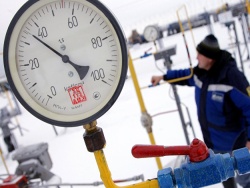
Oil prices benchmark Brent crude to $32 per barrel by 19:00 GMT on the NYMEX. WTI by this time fell below $29 per barrel. The corresponding peak appeared on the background of disappointing for oilers news about the results of the negotiations of the four oil-producing countries — Russia, Saudi Arabia, Qatar and Venezuela. According to the Ministry of energy of the Russian Federation, the parties have agreed to maintain the current year the volume of oil production at the level of last January and not exceed it, but assuming that other producers will join the initiative.
Simultaneously came the news that the price of WTI in the medium term may fall to $10-20 per barrel. This is stated in the overview material BMI Research. The main cause further declines may be a factor in the reduction of spreads between futures contracts for oil and contracts for oil products in the U.S. that, in turn, will lower demand from refineries. Additional pressure on the price of oil will have a repair work in the refinery, which will increase reserves in the terminal Cushing, where the NYMEX-traded oil.
Meanwhile, according to the International energy Agency, Saudi Arabia had made in January to 10.2 million barrels per day, which is below the level of 10.5 million made in June 2015, and Russia 10.9 million barrels, a record for post-Soviet history indicator.
Note that more than a year after the decision of OPEC not to cut production to raise prices. According to Goldman Sachs Group Inc., the fall in the value of a barrel of “Brent” up to $20 a barrel is still possible.
Alexander Kushner, Newsader
ANALYTICAL REVIEW NEWSADER
Once again the hopes of the Kremlin’s hold on oil prices was in vain: apparently, Moscow had pinned many hopes on this meeting with the leaders of oil production. The Russian leadership is vitally important to keep oil prices at least above $35, as the budget for the current year was drawn up based on the price of $50 per barrel.
It is obvious that in this field Russia suffers another setback, including because of too much competition in the market of black gold. On the one hand — the USA lifted 40-year ban on oil exports, with other out-of-sanctions Iran is crowding out the existing players, with the third — Saudi Arabia intends to squeeze Russian oil from Europe: in October of 2015, it announced the delivery of oil to Poland at low prices. As a result, in November the RF Central Bank has reported a decline in the value of the Russian Urals crude at $1-2, linking this fact with the policy of Riyadh.
Remarkable by the very fact of such attention to the issue of oil prices with the Russian authorities and their subordinate sections of the official media, which almost daily delivers information about even the most minor fluctuations in oil prices. The “Interfax” news about the rising cost of oil half dollar is one of the main notes of the day.
While most of the media silent about such obscure for most readers the fact, as speculative gambling, which causes typical for any product price “waves” in the market in the range of 1-3 percent. Essentially, the increase or decrease in the cost of Brent in the range of 2-4 dollars generally should not become a subject for discussions — this is a normal market “noise”. The important thing is that the price of oil for six months but remains below $50, with 20 consecutive months she is in a downward trend, which, apparently, is in no hurry to change to the opposite.
Looks like we are talking about long-term changes in the balance of supply and demand in the energy market, where traditional energy sources are gradually giving way to renewable — not least due to rapid technological progress and care of humanity on the environment. Suffice it to recall the booming market of cars on electric and hydrogen engines, to understand what is the threat looming over the economies of countries whose budgets — such as Russian — fully tied to the export of natural resources.
All of this underscores how exaggerated the strength of the Russian economy, which “blows out” the eyes from one of the world factor — reduce the cost of energy. This, in turn, undermines the basis on which the Pro-Kremlin propagandists build the myth of “greatness” and “statehood” of the Russian Federation.







